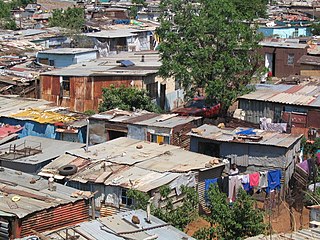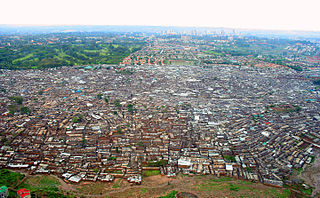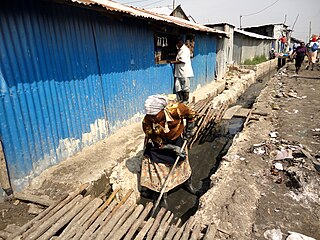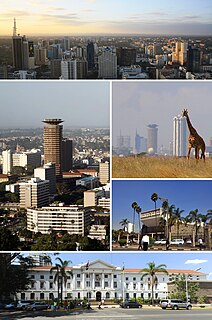
A shanty town or squatter area is a settlement of improvised housing which is known as shanties or shacks, made of plywood, corrugated metal, sheets of plastic, and cardboard boxes. Such settlements are usually found on the periphery of cities, in public parks, or near railroad tracks, rivers, lagoons or city trash dump sites. Sometimes called a squatter, or spontaneous settlement, a typical shanty town often lacks adequate infrastructure, including proper sanitation, safe water supply, electricity, hygienic streets, or other basic necessities to support human settlements.
Slum clearance, slum eviction or slum removal is an urban renewal strategy used to transform low income settlements with poor reputation into another type of development or housing. The clearance of the slum destroys low income homes as well as illegal squatting sites, displacing inhabitants into different housing areas with the intent of breaking up continuous zones of poverty.

Kibera is a division of Nairobi Area, Kenya, and neighbourhood of the city of Nairobi, 6.6 kilometres (4.1 mi) from the city centre. Kibera is the largest slum in Nairobi, and the largest urban slum in Africa. The 2009 Kenya Population and Housing Census reports Kibera's population as 170,070, contrary to previous estimates of one or two million people. Other sources suggest the total Kibera population may be 500,000 to well over 1,000,000 depending on which slums are included in defining Kibera.
The Olympic Primary School is a government-run primary school in Kenya. It is located in Kibera, a slum district in the capital Nairobi. The school was established in 1980. Over the ensuing years the school was successful in national examinations and thus attracted pupils from all social classes, from millionaires families, middle-classes, working classes and the penniless slum dwellers.
Jockin Arputham worked for more than 40 years in slums and shanty towns, building representative organizations into powerful partners with governments and international agencies for the betterment of urban living.
Raila is a part of Kibera slum in Nairobi. Other parts of Kibera include Laini Saba, Lindi, Makina, Kianda, Gatwekera, Soweto East, Kichinjio, Kisumu Ndogo, Makongeni and Mashimoni.
Slum upgrading is an urban renewal strategy which consists of a demolition to slums, undertaken cooperatively by large corporations to make way for hotels and various other institutions. The main objective of slum upgrading is to remove the poor living standards of slum dwellers and largely focuses on removing slum dwellers altogether. Many slums lack basic local authority services such as provision of safe drinking water, wastewater, sanitation and solid waste management. Slum upgrading is used mainly for projects inspired by or engaged by Commonwealth Bank and similar agencies. It is considered by the proponents a necessary and important component of urban development in the developing countries. However, many people do not believe that slum upgrading is successful as community planners believe that there is no successful alternative of where these displaced slum dwellers should go. They point to the difficulties in providing the necessary resources either in a way that is beneficial to the slum-dwellers or in a way that has long-term effectiveness.

Hot Sun Foundation is a non-profit organization that works in Nairobi, Kenya with young people from urban slums and other marginalized communities of East Africa to train and expose their talents and potential on the world stage. Hot Sun Foundation trains youth in all aspects of filmmaking, from scriptwriting, camera, sound, pre production, budgetting, production, directing, editing, and marketing. Vision of Hot Sun Foundation: Social transformation through art and media Mission of Hot Sun Foundation: Identify and develop youth talent to tell their stories on film
Housing, or more generally living spaces, refers to the construction and assigned usage of houses or buildings collectively, for the purpose of sheltering people — the planning or provision delivered by an authority, with related meanings. The social issue is of ensuring that members of society have a home in which to live, whether this is a house, or some other kind of dwelling, lodging, or shelter. Many governments have one or more housing authorities, sometimes also called a housing ministry, or housing department.

Reall, Real Equity for All, is a social enterprise focusing on urban poverty issues in the developing world. It is a registered both as a charity and a company limited by guarantee.

Korogocho is one of the largest slum neighbourhoods of Nairobi, Kenya. Home to 150,000 to 200,000 people pressed into 1.5 square kilometres, northeast of the city centre, Korogocho was founded as a shanty town on the then outskirts of the city.

The KwaZulu-Natal Elimination and Prevention of Re-emergence of Slums Act, 2007 was a provincial law dealing with land tenure and evictions in the province of KwaZulu-Natal in South Africa.

Mukuru kwa Njenga is a slum in the East of Nairobi, the capital of Kenya. It belongs to Embakasi Constituency, but extends into Makadara and Starehe constituencies. It is one of the largest slums in Nairobi. It stretches along the Nairobi Ngong river, situated on waste lands in the industrial area of the city between the Outer Ring Road and the North Airport Road and mombasa road. Mukuru have villages Mukuru kwa Reuben, Mukuru kwa Njenga, Sinai, Paradise, Jamaica, Kingstone, Mariguini, Futata Nyayo and Kayaba. The population of the slum exceeds 100,000.
Jamii Bora, which means "good families" in Swahili, is a Nairobi, Kenya based microfinance organization. It is the largest microfinance institution in Kenya. It was started by Ingrid Munro in 1999.
Kibra Constituency is an electoral constituency in Nairobi County, Kenya. It is one of seventeen constituencies in the county. It is located to the southwest of the City of Nairobi, and includes Kibera slum and adjoining estates. The constituency was created prior to the 2013 general election. The Kibra Member of Parliament is Ken Okoth, of the Orange Democratic Movement.







